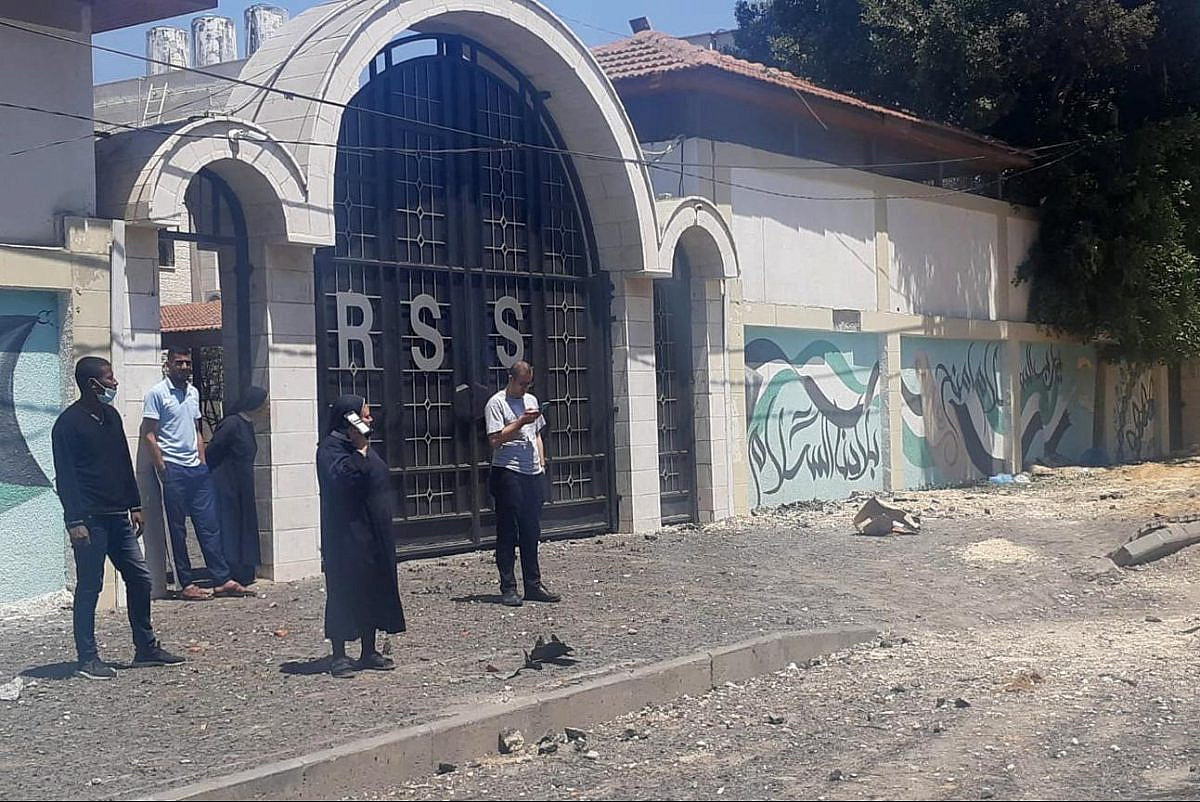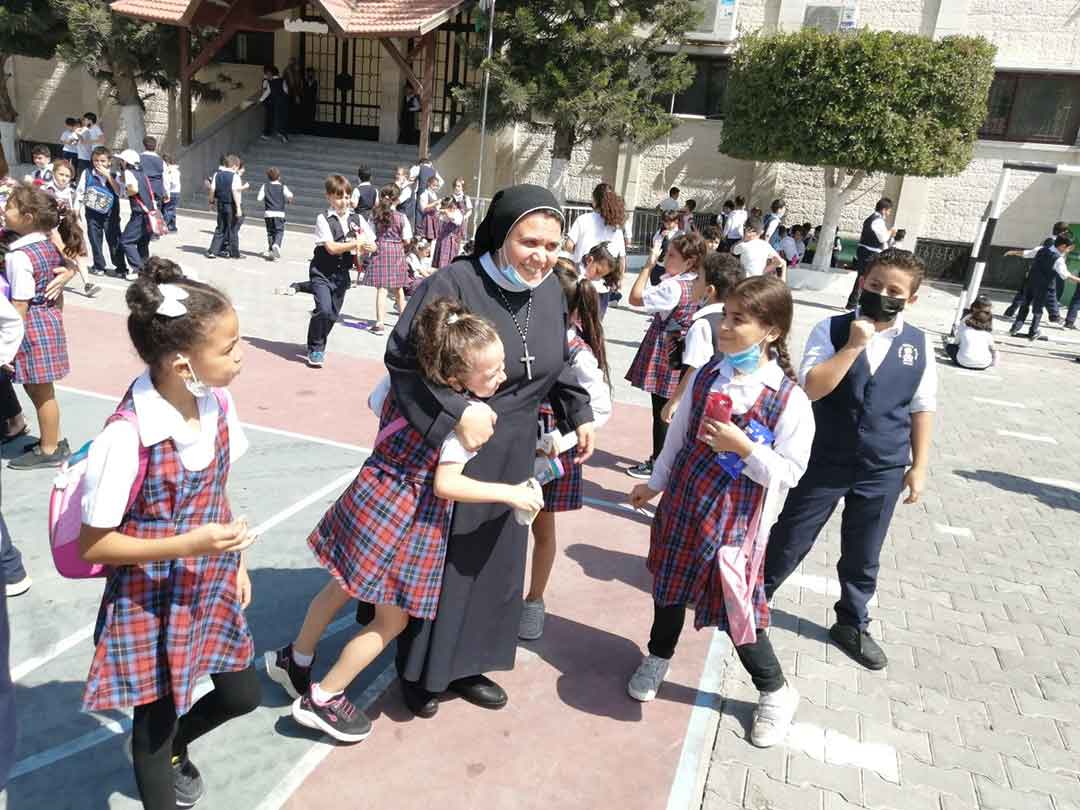Before the war, I was a full-time science teacher. I did some journalistic work in parallel, producing stories about social issues and all the beautiful things in Gaza. Now, I find myself working as a full-time journalist, reporting on the destruction of my school and the killing of my students.
It was something of a coincidence that I started teaching at the Rosary Sisters School, a private Catholic school in the Tal el-Hawa area of Gaza City. After graduating from university nine years ago, I began working with AlNayzak (Meteor) Foundation as an educational trainer: I would go into private and public schools to provide guidance in the sciences for the staff. In 2019, Meteor asked me to go to Rosary Sisters, which had recently built new biology, chemistry, and physics labs — facilities that remain all too rare in the Gaza Strip.
I had only been there one day helping set up the equipment in the labs when the principal, Sister Nabila Saleh, asked me to stay and teach fourth- and fifth-grade science. I accepted the offer immediately, having long wanted to teach young students. It was an auspicious beginning, and it turned out to be one of the most rewarding professional experiences of my life.
I love teaching and forming deep connections with my students. In class, we are serious so that we can learn, understand the materials, and achieve high scores in exams. For the sciences especially, intensive and continuous study and concentration are required. Outside of class, though, the students and I are close. Despite our age gap, I would consider us to be friends.
My home in the school is the science labs. Anyone who needs me can find me there. The students love it there, too: at the beginning of the school year, I draw up a study plan for each class and make sure that there are days we’ll spend in the labs conducting experiments. Even so, during almost every class, the students beg to be allowed to work in the labs.
The remarkable educational opportunities that the school provides — including the labs — are due in large part to the work of the principal, Sister Saleh, who made a great effort to build and completely modernize the school’s facilities. Sister Saleh and the devoted and talented staff hoped to make it one of the best private schools in the area. And indeed they have: since the school was founded in 2000, its student body has grown nearly tenfold, to over 1200 students of both Muslim and Christian backgrounds.
Yet the fact that the school exists in the Gaza Strip means that no matter how much work and devotion is poured into it, the risk of destruction is never far away. During the previous war, in 2021, my lab was badly damaged when the Israeli occupation forces targeted the school; the reconstruction work took nearly a year. Classrooms and other school buildings were also damaged, requiring more intensive reconstruction — some of which wrapped up just weeks before the current war began.
In addition to the physical damage, this destruction was devastating on a personal level: the school is my second home, where I spend eight hours every day.
But the damage to the school during the 2021 war cannot be compared to the complete destruction of the current war. When the war broke out, the school year — which had begun in late August — was immediately canceled, and classes have been unable to resume since. During the subsequent four and a half months, more than 80 percent of the school’s buildings have been destroyed.
In November, while Israeli forces were present in the Tal el-Hawa area, they entered the school with bulldozers and tanks, demolishing the school yard and destroying the wall surrounding the campus. The library — which was filled with books, equipped with a number of laptops, and had a television screen for interactive lesson displays — was bombed, and it burned to the ground. Only ashes remain.
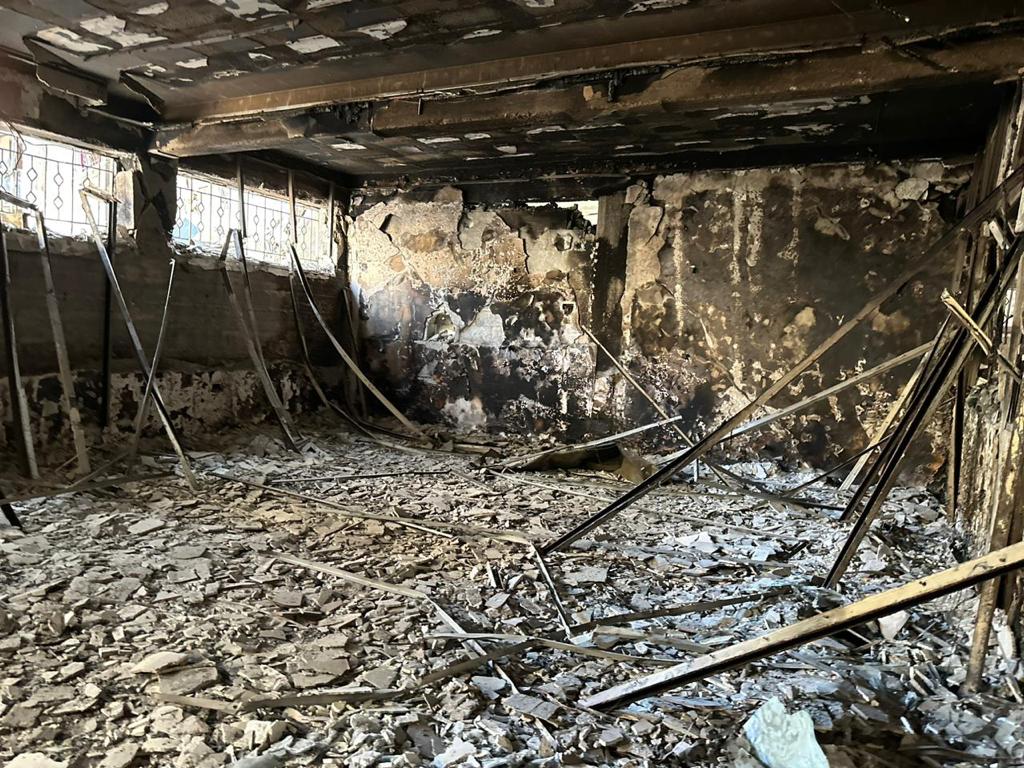
The elevator that was built last year was burned and destroyed, as was the school theater, where we gathered for the most beautiful moments — from graduation ceremonies to national, cultural, and religious celebrations. Israeli tanks and bulldozers even destroyed the kindergarten toys. These are hideous, bloody acts of retaliation.
I was shocked when I saw the images of the damage caused to the school. It is an educational institution; there is no political or military goal that could be achieved by destroying it. Seeing years of hard work be wiped out is indescribably painful.
Lives cut short
Since the beginning of the war, I have been experiencing intense anxiety for the well-being of my students. I care about them not just as a teacher but as if they were my own children. When Gaza City and the rest of the northern Strip began to be displaced en masse, I thought of my colleagues and students: Where are they? What’s happened to them? I had a terrible fear of losing one of them.
Unfortunately, these fears came to pass. I lost two students, Habiba Jarada and Salma Al-Atrash, both of whom were 12 years old and in the eighth grade. Each one had a unique and beautiful personality: they were active, intelligent, affectionate, and sophisticated. Both children were in the midst of developing a strong sense of self and their academic abilities.
Habiba was constantly checking in and comforting those around her. She would always ask me, “How are you doing? The most important thing for me is that you are happy.” When I was tired from classes and the students had exhausted me, she would say, “Who’s making you tired? Just tell me.” Israel killed her during the early days of the war.
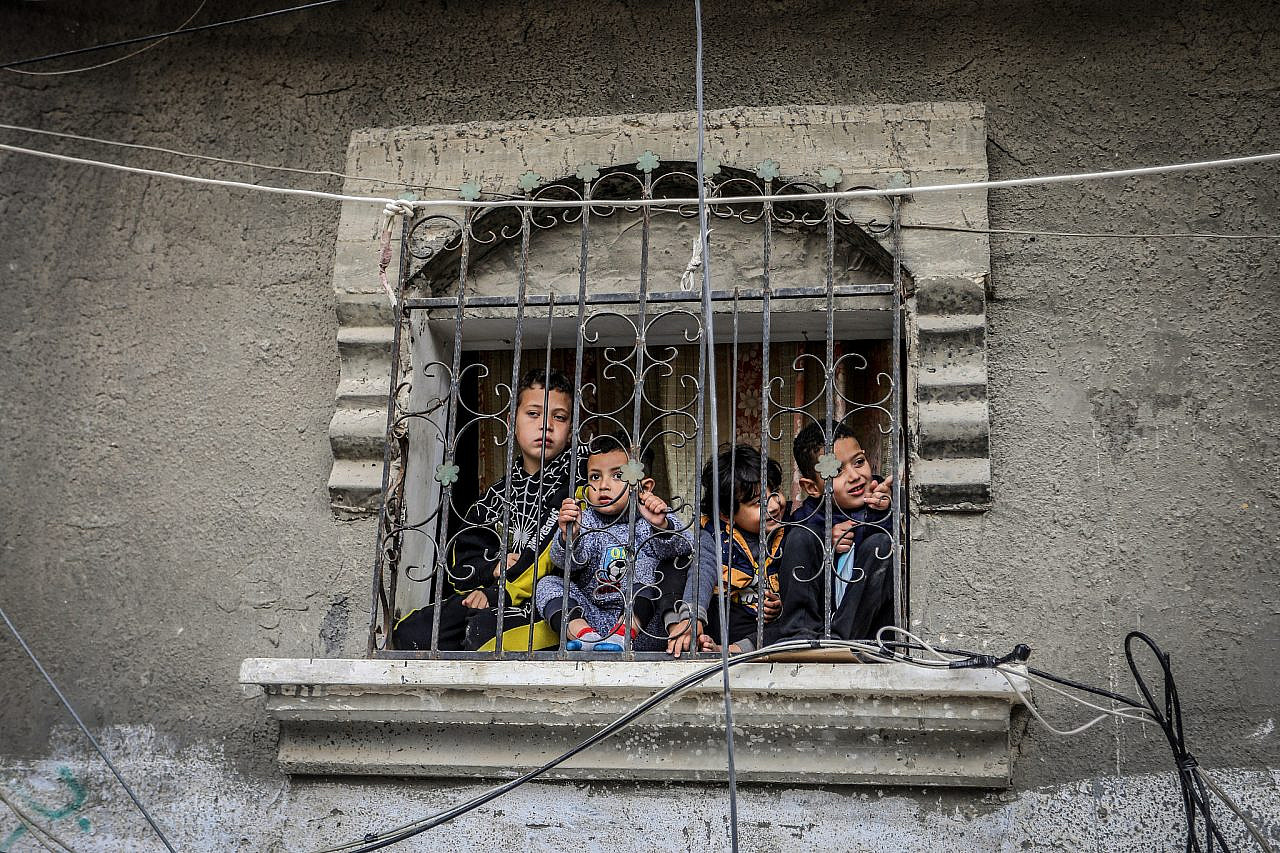
Salma, who was always full of laughter, first became my student a year ago. Shortly thereafter, I also began teaching her brother, Muhammad. He once said to me, “My sister Salma tells me that you are a good teacher, and that I will learn to love science as much as you do.”
Muhammad was a distinguished student, always competing with his friend Omar. He used to tell me that he wished he could take four science classes. After Salma surprised me by dyeing her hair blue, Muhammad would always ask me whether I liked it.
Salma was martyred during a bombing in Gaza City in October. Her family, including Muhammad and their mother, are missing under the rubble — I do not know if they survived.
I still think about the children’s mother, who once beautifully described to me the deep investment parents must make so that their children can reach the greatest academic heights. In Salma she has lost her beautiful and gentle daughter, whom she devoted 12 years to ensuring had a good life.
Some of my students have sent me messages of reassurance on Facebook. I have taught more than a thousand students over the past five years, but only a few of them have managed to reach out to me since the start of the war. Although I am constantly worried for each and every one of them, I am relieved that those who sent me messages are fine and still alive. Some of my students have been able to leave Gaza, and I am grateful that they survived this terrible ordeal.
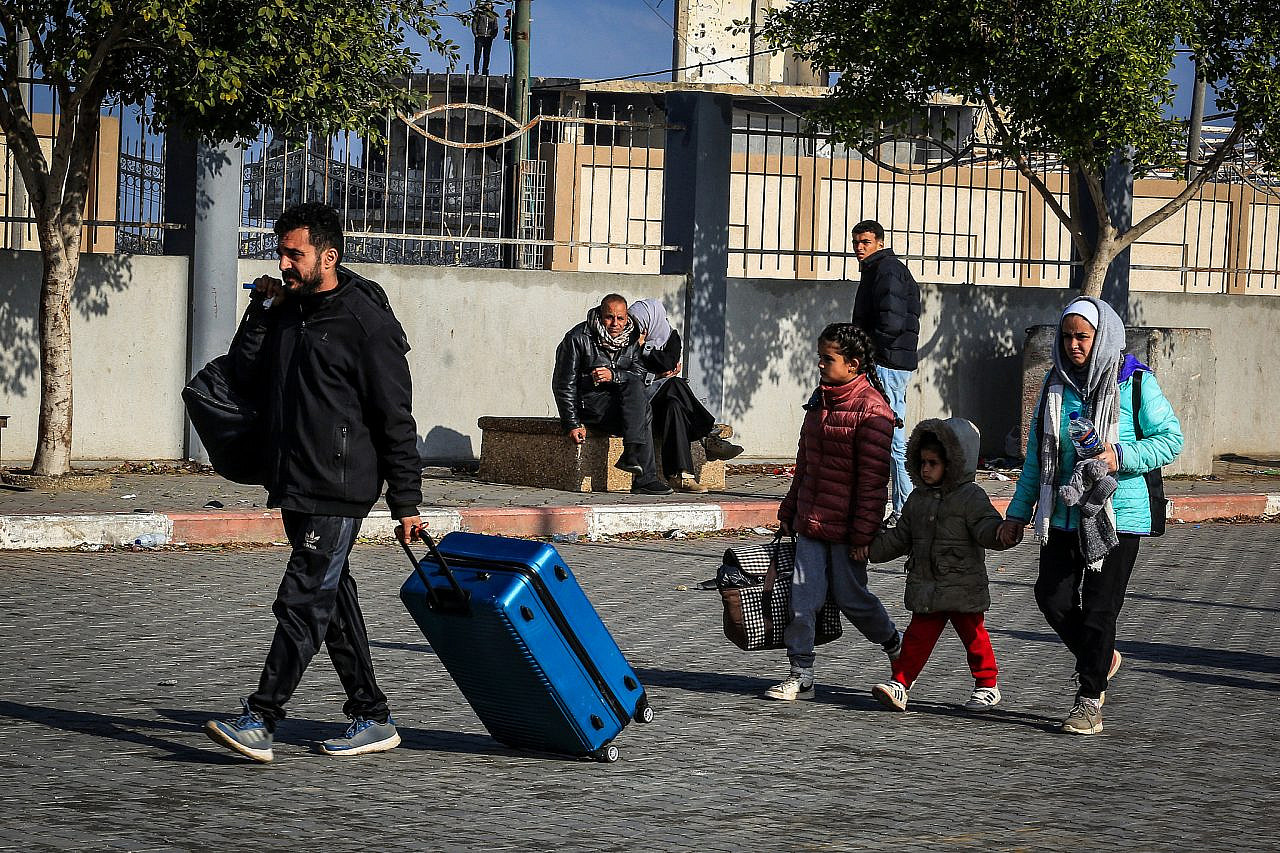
I have also met a number of my students who were displaced to the same areas as me in southern Gaza: some in the coastal area of Al-Mawasi, and others in Khan Younis’ European Hospital, where they have sought refuge with their families. Seeing them brought me great joy, and I hugged them tightly.
Their circumstances are brutal and arduous. They wanted to talk to me, to complain to me about their pain. They told me that they try to shelter inside and avoid going outside, so as not to fall victim to Israel’s missiles. Their faces were pale, their bodies exhausted, and their hearts terrified of the war.
Dreams of returning to school
Like my students, my colleagues at the school are also struggling greatly. There is a WhatsApp group that we use to communicate and check in on each other. All of the teachers have lost something dear to their hearts, a painful void that cannot be filled. Each one has lost their home, and many have lost several, or even all, of their close relatives. But these teachers are strong and pray daily for our survival and for the war to end.
I, too, hope that the war will end and that I will return to my work at the school. Each night I dream that I go back to school and that everyone is fine. I hope that this dream will soon come true — for me and my students.
Last month, I found my sixth-grade student Sarah sleeping in one of the corridors at the European Hospital. When she opened her eyes, she shouted to her mother, “Teacher Ruwaida is here!” Her mother thought she was dreaming, but Sarah insisted it was real. She ran to me, her eyes full of tears, and embraced me. She asked if the school year would be repeated: “Have we lost a year of our lives?”
Most read on +972
I told her that first we want the war to end, and then we can think about such issues. She told me that the most basic tasks have become very difficult: she hardly gets the chance to use the bathroom, and cannot shower. The one thing that enables her to hold on to a remnant of her previous life is the Internet, which she uses to communicate with her classmates and friends.
She asked me to send them all a message telling them that I’m fine. I agreed, but she had one further request; despite the horrors of the last few months, Sarah has held onto her sense of humor. In addition to letting the students know I am okay, she asked me to answer one more question: “When is the next science exam?”

